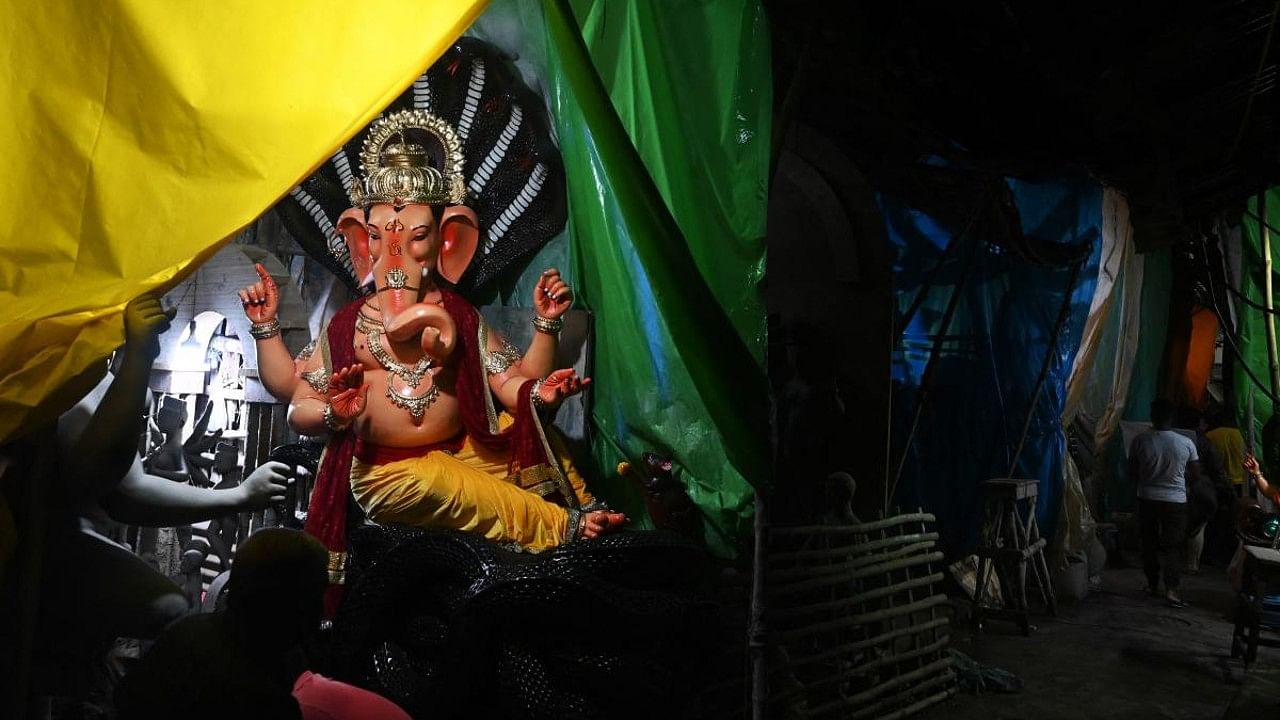
Transcending the boundaries of Mumbai, where Lord Ganesha rules, worship of the elephant-headed god has become popular in the city where the mother goddess rules.
Ganesha Puja, introduced in public spaces by freedom fighter Lokmanya Tilak in then Bombay province on the lines of Bengal’s Durga Puja, has now become popular in Kolkata, a metropolis whose citizens have many devotees of goddesses Kali and Durga.
After low-key celebrations in the last two years due to curbs imposed in the wake of the Covid-19 pandemic, Ganesha Puja this year is being held in a grand manner.
The demand for Ganesha idols had grown so much this time that some artisans of the city’s clay modellers hub, Kumartuli, had to turn down last-minute orders.
"Ganesha Pujas across the city and its outskirts have gone up in the last 10 years. Generally, I make only Durga idols, but this year I had to take several orders for Ganesha 'murtis'," master artisan Sanatan Pal said.
At Muraripukur in central Kolkata, Abhishek Das, a member of a Ganesha puja committee, said 15 friends had come together way back in 2008 to start Ganesha Chaturthi celebrations.
"When we started Ganesha Puja here, in ward number 14 of Kolkata Municipal Corporation, artisans used to make only three idols," he said.
"Anyone visiting their workshops this year will get to see at least 30 to 40 idols of Lord Ganesha there. Many people in and around the area have started organising the puja in the last few years,” Das said.
Joydip Raha of Parnasree Pally Ganesha Pujo Committee in Behala had a similar experience to share.
Around 270 people, who would frequent a cafe, had joined hands some 10 years back to organise Ganesha Chaturthi.
"Even five years ago, two such pujas were held near our locality. Now the count has risen to eight or nine," Raha said.
Amites Mukhopadhyay, professor of sociology at Jadavpur University, cited lack of formal employment, and rising unemployment as reasons for many people to engage in the business of religion and to diversify into new Pujas.
"Festivals and pujas help break the monotony. Also, Bengalis are no longer associated just with white-collar jobs. Times and mindsets have also changed over the years. Many Bengalis are into different kinds of businesses, interest in the god associated with businesses has thus increased," he added.
For Babua Bhowmik, who has been organising Ganesha Puja for many years in the city’s Ultadanga area, welcomed the new trend.
"I have been organising this puja for the last 40 years. Not many people or clubs used to celebrate it then. In a way, it is a welcome trend because clay modellers across the city, including those at Kumartuli, are getting more work, leading to more business," Bhowmik said.
Dr Angshuman Sarkar, professor of sociology at Government Girls General Degree College in the Ekbalpur area of the city, explaining the new trend pointed out, "You must have noted that more and more people in various localities have started organising Jagadhatri Puja too."
The puja was earlier mainly celebrated in Chandannagore and Krishnanagar.
"From the sociological perspective, I think the increase in the number of pujas is because people are trying to divert their minds from all kinds of problems just to feel better and to relieve themselves from daily tension, stress, anxiety, and insecurity," the professor told PTI over the phone.
The sociologist predicted that Ganesha Puja will soon have themes as seen in Durga Puja in the city.
"Various puja organisers are competing with each other – be it with idols, pandals or decorations. They want to turn their Puja into crowd-pullers," the professor, a resident of Salt Lake, said.